Second Week of Advent
An Act of Joy
Download Devotional Bahasa Indonesia Mandarin Chinese (普通話)
The Sacrament of Christmas
By Howard Thurman
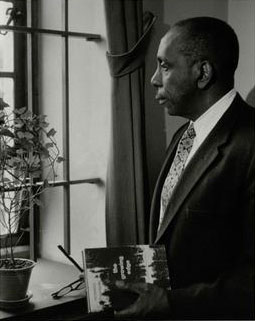
Howard Thurman From the Howard Thurman and Sue Bailey Thurman Collections, Howard Gotlieb Archival Research Center at Boston University
I make an act of faith toward all humankind,
Where doubts would linger and suspicions brood.
I make an act of joy toward all sad hearts,
Where laughter pales and tears abound.
I make an act of strength toward feeble things,
Where life grows dim and death draws near.
I make an act of trust toward all life,
Where fears preside and distrusts keep watch.
I make an act of love toward friend and foe,
Where trust is weak and hate burns bright.
I make a deed to God of all my days —
And look out on life with quiet eyes.
Reflect
As we enter the second week of Advent, take time to reflect on the second stanza of Howard Thurman’s “The Sacrament of Christmas.” How will God use you to “make an act of joy toward all sad hearts?”
Pray
Advent God, while the world around us is making merry and singing choruses of “Joy to the World,” we know that for many, such joy is only on the surface. Many hearts are sad, many hearts are breaking, and tears abound. This week, open our eyes to those who are hurting. May we be the hands of Christ to catch their tears. Use us to bring more acts of joy into your world. In Jesus’ name, we pray. Amen.
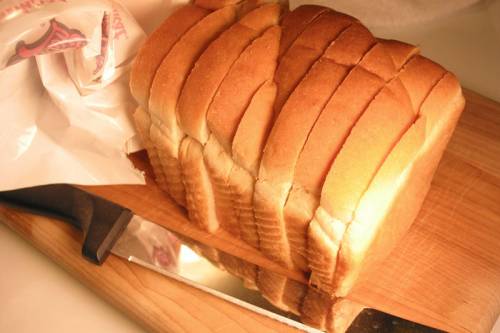 Day 8 | Second Sunday of Advent, Dec. 5
Day 8 | Second Sunday of Advent, Dec. 5
The heel of the bread
But you, O Bethlehem of Ephrathah, who are one of the little clans of Judah, from you shall come forth for me one who is to rule in Israel, whose origin is from of old, from ancient days. — Micah 5:2
The “heels” of the bread — that’s what I grew up calling those end pieces of a loaf that no one wanted to eat. At least, I didn’t want to eat them. Every time I made a peanut butter and jelly sandwich after a Saturday morning of watching cartoons, my little fingers would rummage through the plastic bag of Wonder Bread, reaching past the coarse heel to get to the soft and spongy slices. I can’t tell you how many bread bags, with heels in them, have been tossed into the garbage throughout my life.
Bethlehem, the House of Bread, was the heel of the clans of Judah: an insignificant village where nothing much happened nor would anything great come from it. When it came to putting the plan for salvation into place, God though, didn’t bypass Bethlehem for a much greater clan. Rather, God looked upon the lowly heel of clans as the ideal place for Jesus to be born. In doing so, God sent an important message to us: Stop discarding the “heels of bread” in the world — those people and places we deem unfit or unworthy.
I would like to say I no longer toss bread heels into the garbage, but that would be a lie. My fingers still rummage through the plastic bag, bypassing the heel to get to the “real” bread. But there is someone who doesn’t mind the end pieces: my dad.
I remember many mornings where he would happily take the piece of bread no one wanted. He would toast and butter it and drizzle honey on top. He would then sit at the table and smile at me as I looked on in disgust at him eating that part of the loaf.
There’s something else I remember. As my dad held the bread’s heel in his hand, he would look over at my special-needs brother. His disability was not an easy thing to deal with in our household. I will always carry memories of tension and sadness that permeated the air. There just weren’t many resources back in the 70s for parents of children with special needs.
Perhaps my dad knew there was more to his son than society was seeing, that his son could do more than what the school system judged him capable of doing. Just like the heel of bread, my brother was not something to be discarded. Something great lies within each one of us, no matter what our abilities may be. Everyone is worthy. Everything has value. Just ask God, who chose the unwanted heel of clans — Bethlehem — to be the birthplace of our salvation.
Pray
Loving God, who sees such potential in each one of us, we ask that in this season of Advent we may begin seeing the world with your eyes. Help us to stop overlooking the “heels of bread” in our lives. Help us to see the value, the potential, the goodness and the worth in all that we are too quick to judge and discard. In Jesus’ name, we pray. Amen.
Go deeper
On the second Sunday of Advent, pause and light a candle: either the one on your Advent wreath or any candle you may have in your home. Take your bread, bless it, break it and think more deeply about the “heels of bread” in your life. Who has been discarded, ignored or overlooked? And if you still throw away actual heels of bread, stop. Collect them during this season of Advent and use them to make a delicious bread pudding. Here’s a tasty recipe: kingarthurbaking.com/recipes/maple-walnut-bread-pudding-recipe
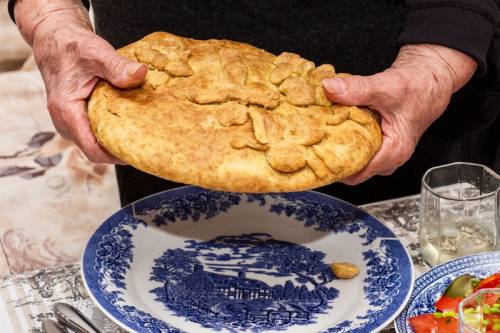 Day 9 | Monday, Dec. 6
Day 9 | Monday, Dec. 6
A platter of forgotten joy
You shall take choice flour, and bake twelve loaves of it; two-tenths of an ephah shall be in each loaf. You shall place them in two rows, six in a row, on the table of pure gold. You shall put pure frankincense with each row, to be a token offering for the bread, as an offering by fire to the Lord. Every sabbath day Aaron shall set them in order before the Lord regularly as a commitment of the people of Israel, as a covenant forever. They shall be for Aaron and his descendants, who shall eat them in a holy place, for they are most holy portions for him from the offerings by fire to the Lord, a perpetual due. — Leviticus 24:5–6
My open-hearth cooking classmates gathered around to look at the bread I had taken out of the clay outdoor oven. The oohs and aahs I had hoped for were nil. I did, though, get a lot of sympathy for my charred and unrisen blob for our dinner. “Better luck next time” and “It was just your first attempt” were some of the things said as we made our way back into the old tavern that served as our classroom.
As the meat pies and baked beans were set out, the cooking instructor noticed I had placed my bread off to the side, hoping it would be forgotten. But it wasn’t. Rather, he vanished into the pantry where the dishes and plates were stored. He soon emerged with a platter in his hand. While it was chipped in a few places, the white porcelain platter with its delft blue flowers and birds was elegant and beautiful. “Put the bread on this and set it on the table,” he said, insisting that what I called a “blob” of bread was worthy of such an honor.
As we dined, we talked about what we learned that day. We talked about the recipes that could have been improved with another dash of salt or more freshly grated nutmeg. When we got to the topic of my dismal bread, it was remarked that while it was not pretty to look at, it was deceivingly tasty. It was also noted that the presentation of a less than perfect loaf on such a beautiful platter was profound. The conversation became philosophical as we talked about beauty mingling with ugliness. What is true beauty? Who gets to define what is ugly?
The candles in the room grew brighter as the meal continued and dusk gave way to the pitch black of night. The conversation lulled as we ate, but was soon broken by an older woman who was staring at the bread on the platter.
“My grandmother always made a special presentation of our daily bread — always! No matter how small the loaf or how stale it was, she would always find a pretty plate for it. She said it reminded her to always be grateful for having not just bread on the table, but others to share it with,” she said.
Howard Thurman once wrote, “Whatever may be the stresses of a particular day, there is always lurking close at hand the trailing beauty of forgotten joy.” Leviticus talks about presenting loaves of bread on a table made of gold. There was no golden table that night to put my loaf on, but that century-old, chipped platter with beautiful blue swirls of flowers and birds was just as precious. What if every day, we took the time to make a special presentation of the daily bread we eat? Could such a simple act be for us “the trailing beauty of forgotten joy?”
Pray
Adoring God, with you by our side, every day becomes a day to celebrate. Help us to see the divine in the mundane. Help us to remember what is ordinary can become extraordinary. Every moment is a moment in which joy can be rekindled in our hearts. In Jesus’ name, we pray. Amen.
Go deeper
During the season of Advent, consider making special bread plates for yourself or to give as gifts. Buy solid color dinner plates and nontoxic, permanent markers and decorate the plates. Perhaps include your favorite Bible verse in the center of the plate. Bake the decorated plates in an oven set at 350 degrees for about 30 minutes. When cooled, wash the plates. They are now ready for loaves of bread to be placed on them.
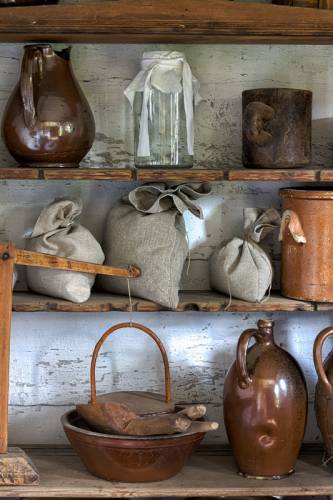 Day 10 | Tuesday, Dec. 7
Day 10 | Tuesday, Dec. 7
Bright hope for tomorrow
“As surely as the Lord your God lives,” she replied, “I don’t have any bread—only a handful of flour in a jar and a little olive oil in a jug. I am gathering a few sticks to take home and make a meal for myself and my son, that we may eat it—and die.” Elijah said to her, “Don’t be afraid. Go home and do as you have said. But first make a small loaf of bread for me from what you have and bring it to me, and then make something for yourself and your son. For this is what the Lord, the God of Israel, says: ‘The jar of flour will not be used up and the jug of oil will not run dry until the day the Lord sends rain on the land.’” She went away and did as Elijah had told her. So there was food every day for Elijah and for the woman and her family. For the jar of flour was not used up and the jug of oil did not run dry, in keeping with the word of the Lord spoken by Elijah. — 1 Kings 17:12–16 (NIV)
History remembers Mary Tilden Dewey as the feisty housewife who made 80 loaves of bread to feed the colonial soldiers on the eve of the Battle of Bennington in 1777. The trough used to mix the dough now sits in a museum in Bennington, Vermont. Every time I have seen it behind the display case, I have found myself wondering what was going through her mind as she toiled over the hot fires making sure all those loaves didn’t burn. Did making the bread help ease her fears and worries? Did it give her hope for an uncertain tomorrow?
During the height of the COVID-19 pandemic there was a surge in bread making. Perhaps people were seeking to ease their fears through the primal act of kneading. Whatever the reason, all this bread making ultimately led to a shortage of flour — which didn’t help in the easing of fears category. If anything, it added to a growing sense of despair. What would tomorrow bring?
The widow of Zarephath, whom the prophet Elijah visits in 1 Kings, knew what tomorrow would bring: death for her and her son. There was a famine in the region, and she had just enough flour and oil for one more loaf. So, when Elijah comes knocking at her door and requests bread to eat, of course, she laughs bitterly. Elijah, though, tells her to make the bread and she will see there will be enough for her tomorrows.
We are not free of the global pandemic yet. There are still communities experiencing surges in virus cases. There are still too many deaths. And, yes, there are still empty shelves in grocery stores — something I never thought I would see in my lifetime. There are times I worry about having enough for my tomorrows, and I must fight through the tendency to hoard.
I need to remember that if I am ever without enough flour for my bread, I can reach out to a friend or neighbor and ask, “May I borrow some flour?”
When was the last time we ever knocked on someone’s door and asked to borrow something we didn’t have enough of? In an earlier time, the knocks on our door were expected and answered. Flour, sugar, butter and eggs were always willingly given. It was part of the unspoken, sacred pact of being in a community. I was hoping that our time of pandemic living would have helped us renew that sacred pact of being here for one another. I’m not so sure it has.
I went through my pantry the other day. I needed brown sugar to make my molasses crinkles for the church’s Christmas cookie exchange. As I scanned the shelves, I discovered four bags of flour behind the oats and rice. I remember the day I put them into the shopping cart. My husband looked perplexed. “There’s a flour shortage. We need bread,” I replied. He then pointed out that the store’s bread aisle was fully stocked.
I really didn’t need all those bags of flour, did I? Many tomorrows have come, and God has provided. But there is someone who does need that flour. As hunger in the U.S. and around the world grows, there are many more “widows of Zarephath” among us. I looked at the flour and asked myself, “What else have I hoarded that could have helped someone in need?”
Pray
Provider God, forgive us for the many times we have hoarded in fear of not having enough. Help us this day to trust that our “flour and oil” will never run out and, in that trusting, may our hearts become ever more generous. In Jesus’ name, we pray. Amen.
Go deeper
Throughout this season of Advent, you are encouraged to bake bread and share it with others in your community. As you do, take time to explore ways to eradicate hunger for good. Bread for the World, a Christian advocacy group, has many ways you can work toward that goal of everyone having food on their table. Visit bread.org to learn more.
 Day 11 | Wednesday, Dec. 8
Day 11 | Wednesday, Dec. 8
Hungering for God’s word
The time is surely coming, says the Lord God, when I will send a famine on the land; not a famine of bread, or a thirst for water, but of hearing the words of the Lord. They shall wander from sea to sea, and from north to east; they shall run to and fro, seeking the word of the Lord, but they shall not find it. — Amos 8:11–12
The old wooden windmill stood on a mound of green: a silent witness to a time when its weathered blades once turned with the wind, producing flour to feed others. But that day in East Hampton, New York, no one seemed to take note of the relic that was built in the early 1800s. Cars whizzed by, never stopping to learn more about its history, never pausing for even a second to hear how vital the mill was to the survival of those who came to this part of Long Island so long ago.
I stopped, though. I was intrigued with Old Hook Mill, one of the 11 historic wooden windmills that still stand on Long Island. I was in the Hamptons to fill in the pulpit for a friend who was on vacation. I think I might have been the only person to come to the playground of the rich, with no desire to sit on the beach, shop the tony retailers or dine in one of the many upscale eateries. I preferred to explore the Hamptons of yesteryear — to hear the whispers of wisdom from the past rather than the empty promises of the present.
So, there I was fighting traffic to find a parking space close to the windmill with no such luck. I parked where I could and walked on the crowded sidewalk, past the packed outdoor cafes. When I got to the windmill, I was delighted to see it was open for tours. I paid my $5 and went in. A young woman looked just as delighted to see me. She looked out the entryway of the mill, nodded to the traffic going by and said, “I don’t get many visitors. No one seems to be very interested in hearing how this mill once fed thousands.” She continued her history lesson, telling me that an 1860 “Census of Industry” recorded that Old Hook turned 5,000 bushels of grain into flour that year. “No one went hungry. And today? If there was a need to have to make our own bread, this mill could once again be operational,” she said, “But no one seems to recognize what this mill has done and still can do.”
The prophet Amos comes to us this Advent speaking about a famine the Lord will send. And when he mentions the famine will be one of hearing God’s word, I can’t help but think about the Old Hook Mill and its message of provision that was not being heard. God stands among us this day, wanting us to listen to where our hungers will be met. But we whiz by God during our busy days with so many things to do. This Advent, may the Spirit’s wind start turning the spiritual blades in our lives so that we truly hear God’s life-giving words.
Pray
Steadfast God, you are always amid our lives, but so often we run right by you, failing to see, failing to hear, failing to pause and recognize how you nurture and care for us. We pause right now and acknowledge you. We need you. We want you. O come, O come, Emmanuel and revive us. In Jesus’ name, we pray. Amen.
Go deeper
Delve into the history of where you live. Scour the archives of a library. Talk to a local historian. Hear again the stories of provision: a time of coming together and a time of revival in your community. What are the “windmills” that have gone unnoticed?
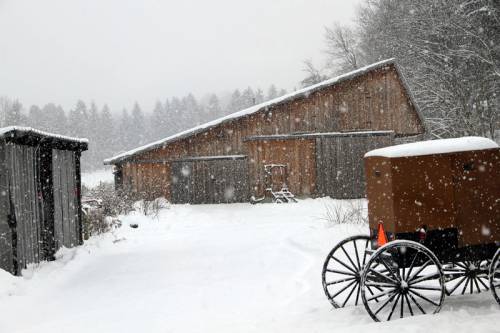 Day 12 | Thursday, Dec. 9
Day 12 | Thursday, Dec. 9
I want to be Amish
Day by day, as they spent much time together in the temple, they broke bread at home and ate their food with glad and generous hearts. — Acts 2:46
Red brake lights flashing on and off were a strange sight to see on this strip of rural road. It was strange because there was hardly ever another car to be seen for miles. Even stranger was the reason for all these cars. There was an Amish barn raising taking place on the property of a local farmer, and many people came to watch. There had never been Amish before in this part of upstate New York, which bordered Vermont. But here they were. And I was excited.
One of things I knew I would miss when leaving the church I had served in Maryland was the clip-clop of horses that pulled the Amish buggies. I lived close to the border of Pennsylvania, which many Amish and Mennonites called home; so slowing down for buggy traffic was expected.
I would miss seeing the Amish because I have always secretly admired their way of life: their conviction to live in a way that goes against the grain of modernity, their courage to say no to technology and their commitment to live in a tight-knit community with others.
During my Manhattan days, where I was a young editor covering the fashion industry’s influence on fine jewelry designs and the newest creations, I would often say on my stressed-out, drop-dead, deadline days: “I want to be Amish.” My colleagues would look at me in disbelief that I, standing in designer shoes and wearing a fashionable dress, was saying such a thing. As much as I loved the life I had, deep down I knew it was not where my ultimate fulfillment would come.
“I want a simple pegboard to hang my one dress on. I want to live off the land, make my bread and be thankful for the little things in life,” I would say.
The Amish are known for simple living, but their life is anything but simple. When I drive by the Amish weeding their huge gardens by hand in the heat of summer, I start to feel weary. When I see them plowing the hard, stone-filled soil in this part of the country with just their horse and plow, I can’t imagine how challenging it must be. It is backbreaking work for me to break just a small patch of new ground for a garden bed with a high-powered tiller.
I no longer see Amish living as simple. Rather I see it as sacred. And perhaps that is the life I have wanted: the sacredness of breaking bread together not just once a month in church, but everyday around a table filled with friends who I know are there for me and I for them. I want the sacredness of community that the Amish represent as they help one another build a barn, sew a quilt and pickle beets. I want the sacred life modeled by the first Christians who Acts tells us came together, sharing bread, sharing possessions, sharing joys and sharing grief.
The Amish have come to upstate New York. I once again get to hear the clip-clop of horse hoofs on payment. I get to slow down on my rural roads to let a buggy pass by. And each time I stop at their roadside bake stands and buy a shoofly pie or a loaf of Amish Friendship Bread, I hear my younger self gently remind me of my desire I have still not fully realized: “I want to be Amish.” I want the sacredness of a life together where we build up, rather than tear down, and where fractures are healed in the act of sharing our daily bread.
Pray
Companion God, at the very beginning, you envisioned us not to live isolated lives, but to be in a community. You gave Adam a helper in the garden. Jesus paired disciples to go out together to share the love of God. And the early Christians came together regularly to break bread and share stories of your goodness. Help us to widen our circles of community. Help us to redefine what community is. Help us to honor the sacredness of living together in peace and with joy. In Jesus’ name, we pray. Amen.
Go deeper
How sacred is the community you are living in? What are the new communities God is asking to be created where you live? Challenge yourself this day to really see who is missing in your community that you call your church.
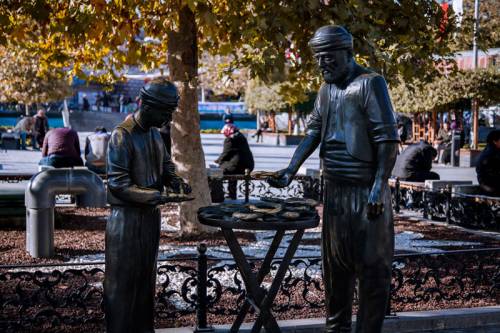 Day 13 | Friday, Dec. 10
Day 13 | Friday, Dec. 10
Bread, the universal language of love
Because there is one bread, we who are many are one body, for we all partake of the one bread. — 1 Corinthians 10:17
Bread has been “the staff of life” in all cultures for thousands of years. In China there is “mantou,” which is dough that is either fried or steamed. In India, there is “naan,” which is unleavened bread baked in a clay oven. Corn tortillas are the staple in Mexico; while in the Philippines, “pandesal,” which means “bread of salt,” is a bread usually eaten for breakfast. In South Africa, there is a bread that is more like a firm pudding and called green mealie bread. Green mealies are a type of sweet corn; thus, the bread is more like a dessert. I know because I had the privilege of tasting it. It was a slice of heaven on earth.
In my former life, I travelled the world for a fine jewelry magazine, reporting on trends and the market prices of diamonds (thus, the trip to South Africa and its many diamond mines). I had the opportunity to taste the bread of life in all its delicious incarnations. But the memories that have been my most treasured ones are not of all the breads I got to taste. They have been of the times where I, a stranger in a strange land, found myself welcomed — even cared for — by angels bearing bread.
“Flight 202 has been delayed. Please check with the gate attendant for more information.” I sighed with all the others gathered at the gate. I was eager to get back home to New York City. My week in Bangkok had been long and grueling. It had been one of those trips where everything that could go wrong did. On top of all the glitches, I hadn’t packed appropriately. I had loaded my suitcase with wintry sweaters that were just wrong for Thailand’s high humidity. I sweltered, not wanting to wear for seven days straight the one and only appropriate cotton shirt I had packed.
If that wasn’t enough, I was also nursing a broken heart. Where I really wanted to be was not in an exotic part of the world, but in my apartment, crying into a pint of ice cream. I sat in the hard chair staring into space, thinking about the losses in my life. The more I thought, the more my eyes began filling with tears.
At first, I didn’t notice the three Thai women nearby who, even though there were plenty of chairs to sit in, were seated on the floor. But their colorful chattering got my attention. I watched as they reached into their bags for food, taking out stacks of roti, a pan-fried flat bread, and what looked to me to be the curry rolls I had fallen in love with all week. They sat cross-legged in a circle making this makeshift airport meal into a ceremonial banquet.
Suddenly, their chattering stopped. All eyes were on me. I gave a feeble smile and tried to look away. They would not have that. They patted the empty space in their circle, inviting me to join them. I shook my head no, but they insisted. A hand holding a curry roll was extended to me, insisting that I take it. I nodded a thank you.
While Christmas is a Christian celebration, Howard Thurman always felt its message has something for people of all faiths and even no faith, writing, “For the Christmas season, we affirm our solidarity with the whole human race in its long struggle to become humane, and to reveal divinity with which all humankind shares.”
I eventually made my way onto the floor, joining their circle. They didn’t speak English. I didn’t speak Thai. Yet they could see I was hurting as one women pointed to my tears and then placed her hand over her heart. Her two friends gave a knowing smile. They too had known heartache. More bread was passed. My heart was lifting. Bread is not the only thing that is universal. Heartache is as well. And so is the ability to be humane to one another.
Pray
Universal God, help us this day to remember that in all our differences — from the way we look, to the language we speak, to the bread we break — our hearts can still beat in sync with one another. May we remember more the many things we have in common with others rather than focus on what keeps us apart. In Jesus’ name, we pray. Amen.
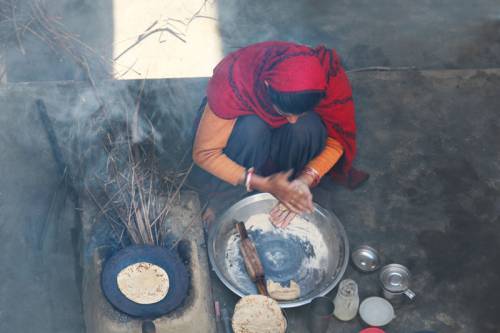 Chapati
Chapati
Bread is the universal language of love and of welcome. As the second of week of Advent winds down and we prepare to enter the third week of this holy season — lighting the third candle on the Advent wreath this Sunday, our recipe will be from another part of the world — “chapati,” which is an unleavened flatbread common in many South Asian countries. Made with white whole wheat or sprouted wheat, this bread is easy to roll out. It has a mild, slightly sweet flavor and is a quick accompaniment to serve alongside most any meal. This recipe is one that doubles nicely — making it easy to share. Go to: kingarthurbaking.com/recipes/whole-grain-flatbread-chapati-recipe
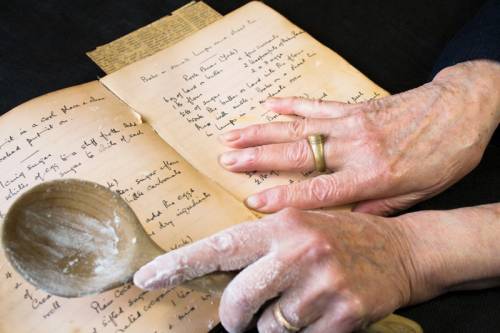 Day 14 | Saturday, Dec. 11
Day 14 | Saturday, Dec. 11
Angel biscuits
Weeping may linger for the night, but joy comes with the morning. — Psalm 30:5
There is nothing more comforting than walking into a home with bread that is baking in the oven. The scent is like a warm embrace. It’s comforting. It’s nostalgic. This time of year, especially, when I smell bread baking, I find myself remembering Ella and the gift she gave her family of faith.
Ella was a farm girl through and through. Or so I heard. Sadly, I didn’t get to know her as she was already in hospice when I came to the community as pastor. But I heard the stories of how she would tend to the goats and cows, mow the lawn with a push mower well into her 80s, and how she was always dreaming up one more mission project for the church. What Ella was most famous for, though, was her light and fluffy biscuits. She made them for every church dinner. She made them as gifts for those who were sick or grieving. She made batches and batches of them for families with young children that she knew were hungry.
A few days before she died, I went to her. As usual, there was a steady stream of visitors. The first thing that greeted me when I walked through the door was the scent of biscuits baking. Ella’s daughters were busy in the kitchen baking them. Ella was in a bed set up in the living room with a view of the kitchen, her eyes opening every now and then to check in on the bakers. There was also a tree set up on the other side of her bed. The only decoration, aside from the white lights, was an angel on top. With her soft wings unfurled, her head tilting in Ella’s direction, it looked to me like the angel was keeping a close watch over Ella. Before I left, Ella’s daughters told me how much their mother wanted to make one more batch of biscuits for her church family.
Ella died two days before Christmas. As I sat with the family making funeral arrangements, the daughters had an idea: Would it be possible to make Ella’s biscuits and hand them out to the congregation as a gift at her funeral service? I had a better idea.
Christmas Eve came and as was the tradition in the church to celebrate the Lord’s Supper on that night, I made sure to have the biscuits Ella’s daughters had made. And inside the worship bulletin, was a copy of Ella’s recipe. As worshipers opened their bulletins and saw the recipe, eyes filled with tears. Visitors who didn’t even know Ella were touched as well. And as I prepared to invite the children of God to come to the table to share the bread and cup, I announced that the bread would the biscuits that Ella was so famous for: biscuits made from her worn, torn recipe card that read: “Angel Biscuits.”
“Truly he taught us to love one another” was heard from the choir singing “O Holy Night” as the communion elements were shared. It was a lesson Ella mastered in her life, showing her love for others one “angel” biscuit at a time.
Pray
God, in this season of joy, we find ourselves wiping a tear, remembering those who are no longer with us. We take comfort in knowing, though, that someday we will sit at the heavenly table together again with those we miss. Till then, we thank you for the many ways their memories live on, be it a treasured recipe or a funny story that we share at the holiday table. In Jesus’ name, we pray. Amen.
Go deeper
What are the treasured recipes in your family? Collect them and compile them into a book to pass along the memories to others.
